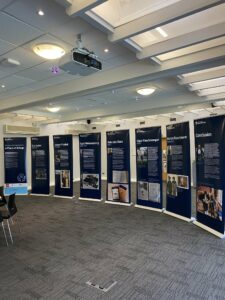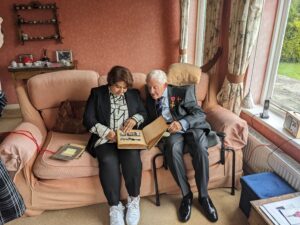Refugees have help shape the University of Southampton and make it the world-leading institution it is today. Like much of refugee history, however, that contribution remains largely invisible. As Southampton is soon to gain status as a ‘university of sanctuary’, making itself accessible to those fleeing persecution, it was a good moment for those in the Parkes Institute to reflect on these refugees in the past, especially Jews escaping Nazism. Neil Gregor and myself, with support from the Association of Jewish Refugees and the German History Society, researched and produced eight pop up posters that forms a travelling exhibition.

Framing it in a wider history of refugees, past and present, the exhibition focused on the life stories of six refugees from the 1930s, two of whom remarkably are still alive, Gabrielle Ganz who was a professor in the Faculty of Law, and Edgar Feuchtwanger, who was equally prominent in the Department of History. Both Gabrielle and Edgar came as child refugees, recovering their school education and then studying at university in the UK. A third child refugee was Martin Fleischmann who helped build up the Department of Chemistry and was world famous for his work on cold fusion.
Two of our posters are devoted to refugees from Nazism who had already developed outstanding careers in their fields. Karl Weissenberg came to the then University College, Southampton, in 1934 through the efforts of the Academic Assistance Council, now CARA (Council for At-Risk Academics) and transformed the Physics Department. Coming a little later, Eric Zepler founded the Department of Electronics and this centre of excellence is still named after him.
The refugees mentioned so far came from Germany and Austria. Coming from Poland, Josef Frankel was also fleeing antisemitic persecution. He helped make the Department of Politics a leader in the study of International Relations.

Our final poster features Edgar Feuchtwanger talking with Atafa Tajik from Afghanistan who is doing a PhD in the History Department. Old and young, they are part of the university’s rich history and one that we can take pride in as a place of sanctuary for people we present as extraordinary in their contribution, and ordinary as warm human beings with family and friends.
The exhibition ‘A Place of Refuge’ will be shown at theUniversity of Southampton’s annual Hands on Humanities Day, which usually attracts a couple of thousand visitors, and which takes place this year on 9 November; further showings are planned later in the academic year.
Tony Kushner is James Parkes Professor of History at the Parkes Institute for the Study of Jewish/non-Jewish Relations and History Department at the University of Southampton. He has written widely on the British Jewish experience, especially social history and comparative migration. His recent books include The Battle of Britishness: Migrant Journeys since 1685 (Manchester University Press, 2012) and Journeys from the Abyss: The Holocaust and Forced Migration from the 1880s to the Present (Liverpool University Press, 2017). He is currently working on a study of a Jewish triple murderer and, with Dr Aimee Bunting, Co-Presents to the Holocaust. He is co-editor of the journal Patterns of Prejudice and deputy editor of Jewish Culture and History.